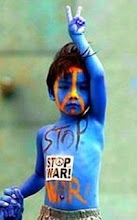Are primitive cultures, like the Sawi, necessary in our present world?
2 comments Posted by choism at 5:39 AMHowever primitive cultures like the Sawi are ‘valuable’ in our present world. We might not agree with everything about the Sawi culture but it is without doubt that their culture is deep rooted and unique. There are so many things to learn about another culture and demolishing it because we think that it is obsolete is definitely an act of negligence. I want to compare the present world as a complete set of a puzzle. Small bits and pieces make up the ‘whole’ and it wouldn’t be complete when some pieces are missing. Everything that exists in this world has a purpose and importance irrespective of how useful and effective they are and instead of complaining about having primitive cultures like the Sawi, we should be more considerate and appreciative about the existence of such a distinctive culture.
How would uncivilized cultures react upon receiving technology beyond their comprehensions?
0 comments Posted by choism at 4:50 AMWhen people are first encountered with revolutionary ideas they are more likely to be revolted because they feel that conventional principles and standards are being destroyed by sudden appearance of technology that is never heard of and never thought of. The Sawi are startled when they first recieve axes and fishing poles because they have little understanding of each object's purposes. This technology that is about to appear is something that people might have been refusing to come out because when it does, it will leave research and all the effort futile. They might question themselves, why they should accept something that makes life more difficult, before they understand the true implications of the technology. People tend to believe and perverse in what they think is right for them, and they don’t even have a glance at others that appear ‘worse’ or ‘better’; this human nature has been an obstacle in human development.
Eventually people will recognize what the new technology is capable of doing and they will try to change the old thinking of 'it has always been there' by shifting their minds to adapt to this new field of technology. Technology that is beyond imagination for ‘uncivilized’ cultures might seem out-of-date in our present world, but tribesman will without doubt be dumbfounded just like us. 'Uncivilized' people are just humans like us and I expect the same reaction from them.
Even though both cultures look different from outside, I believe that the centre core, the meaning and the value of culture is equal irrespective of how they might appear. There is no ‘correct’ definition of culture because it can be interpreted from different perspective. Arguing about whose culture is ‘better’ is futile because any culture is valid as long as there is a belief system, faith, custom and tradition. People just have different ways of pursing what they believe.
From ‘Abner hale’ and ‘fray Diego de Landa’ missionaries have sometimes acted in a culture-destroying manner. Do we ignore what the UFM missionaries have accomplished with the Wai Wai culture? What about the amazing feat by numerous missionary groups like The Missionary Alliance? History has proved that leaving these uncivilized people doesn’t work and that somebody needs to get there to help and guide these people into Christianity. They risk their lives to get them first because they believe that they are ‘more sympathetic agents of change than profit hungry commercialists’. These tribes cannot be completely isolated from the rest of the world. They need to communicate. The missionaries are just providing a more convincing way for them to merge and become a part in our society.
Missionaries use moral persuasions to engage with the tribes, and they know what will happen to these people when they fail to deliver the message; the government will eventually use physical force. As Don Richardson puts, the missionaries are giving the tribal ‘a rational basis for giving it up voluntarily before the guns of the police decide the issue with traumatic effect’
People say that missionaries are destroying cultures. Even though the outer appearance and act may change, influenced by outside people, the center core of a culture doesn’t change. The missionaries aren’t disregarding the values of culture and faith but they are simply refining certain aspects of a culture to make them ‘better’. The introduction of Christianity has already begun and we should now make them feel like they are part our society.
What should society do for “uncivilized cultures” like the Sawi?
1 comments Posted by choism at 7:14 PMWe are at the time of history when tribes like the Sawi can be influenced by the others. We should teach them what we value in the world and show them how we practice our faiths. Before doing this we should learn and experience the ‘uncivilized cultures’ just like what Don Richardson did. We don’t expect them to transform suddenly because we know how difficult accepting a whole new culture and I know this because I have experienced twice in my lifetime; when I went to Malaysia and Switzerland. The cultural shock I felt is incomparable to what the Sawi must have felt. It may take long for them to accept the reality and we shouldn’t doubt that there will be any changes to these people but we must have patience, faith and trust. They will slowly acknowledge and become ‘civilized’
“The advanced enforces the behind or the behind resist the advanced” We are not telling them that our culture is right and that theirs is wrong. We are not demanding for them to abandon their culture and faiths. We are not forcing them to become just like us. We just want what is the best for them because we have compassion and respect towards their culture. There may be obstacles, disrupting our guidance but our passion and patience will overcome whatever stands in front of us.
What should we do when we are confronted with other cultures?
0 comments Posted by choism at 6:42 PMThere are situations where people tend to show the positive side of their culture and conceal the side that they don’t want others to see. This makes perfect sense because people have always wanted to show the best of what they have. This is a human nature that cannot easily be altered. People only tend to embrace the outstanding fruits of human culture but we have to recognize that what we are seeing isn’t everything about it. There might be cultures that seem to show some negative sides and in the other hand there are cultures that brag about how wonderful and enticing their culture is but as a matter of a fact the one that is being honest may be the one that people are looking for. Instead of judging according to their appearance, we should try to understand and experience what other cultures value.
There are also situations where people discard the excellence of other cultures. They either feel jealous or they might be feeling the danger of the uprising power. I think it is morally wrong to deny cultures because they are simply better than us or to compete with each other over whose culture is superior. I mean, it is natural that there are conflicts when two cultures meet because it is evident throughout the course of our history that the acceptance of other cultures hasn’t been smoothed. When people are confronted with cultures that are exemplary, people should learn how to acknowledge the righteousness and strive to enhance their own.
What does God expect us to do for other cultures and faiths?
2 comments Posted by choism at 10:33 AMGod wants people to understand each other. God wants people to live peacefully, acknowledge other cultures and respect their faiths. People have to stay open-mined and embrace what other value - just like giving free hugs.
When we are confronted with ‘uncivilized’ culture like the Sawi, we shouldn’t force them to change their culture and faith but we should rather wait with patience until they have trust and respect in what we pursue. People will know that we are harmless and what we are bringing is for the best of their culture. When I first encountered Swiss culture, I felt perplexed because it was a great cultural shock for me. The reason why I became to like Swiss culture and even love it is because nobody has forced me to accept something I wasn’t ready for. Of course the transition hasn’t been perfect, having few tumbles but I slowly came to accept what they believe and what they value. People haven’t urged me to change but they waited for me with patience and that won my appeal.
It seems that the process of accepting another culture cannot go entirely peacefully. Perhaps this is God’s intention because people learn form their mistakes. People accept the virtue when they have experienced how bad evil is. A culture cannot be ideal from the beginning of the creation but there had to be adjustments to cover the flaws and to make a more ‘idealized’ culture. In our standards, there is no perfect culture; it can only get better.







